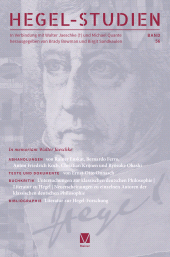Hegel-Studien, Bd. 56
254 p.
Rainer Enskat: Die Form der Dialektik in Hegels Phänomenologie des GeistesAbstract:In his Phenomenology of Spirit Hegel has - in comparison with the enormouscomplexity of the whole work - in a somewhat hidden way hinted at the formal nucleus of whathe conceives of as dialectic, especially as the dialectical movement. This movement has the formof a sceptical examination, testing the claims of the consciousness to be in the possession ofknowledge. Such a claim is bound, as Hegel shows, to many different cognitive levels of theconsciousness - beginnig with sensual certainty and ending with absolute knowledge. The wayof the examination corresponds exactly to the levels of the consciousness. But on its way to theabsolute knowledge the examination encounters, appropriate to its sceptical intention, as manynon-veracious forms of knowledge as are different from absolute knowledge. Each sceptical testwhich encounters a non-veracious form of knowledge presents necessarily the nothingness ofwhat it is the result, a
result which contains what the foregoing non-veracious forms ofknowledge save anyhowas true. In the following article it is to show that this nucleus of the formof the dialectical movement stands the test ifapplied to the step resp. jump from sensual certaintyto perception. If the following interpretationsand analysesare founded well enough it is justifiedto be confident that interpretations and analyses of further 'experiences of consciousness' on thesame line can be fruitful.Bernardo Ferro: How Platonic is Hegel's Dialectic? A new approach to an old debateAbstract:While in recent years the link between Hegel and Aristotle has been widelyexplored, Hegel's Platonic heritage seems to have faded into the background. This asymmetry ispartly due to the standard characterization of Plato as a dogmatic metaphysician, committed to a"two-world" ontology. In this paper, I show that Hegel's engagement with Plato stands outprecisely for his rejection of this kind of reading and, moreover, that this attitude sheds
circular negation that are operative in the logic of being, essence andconcept respectively are distinguished and all findings are related to Hegel's text. The discussiontakes place within the framework of classical metaphysics and logic (Plato, Aristotle, Leibniz) andcontemporary analytic metaphysics. In particular, Michael Della Rocca's radically monisticParmenidean Ascent (2020) to Being is discussed as a profiling foil against which Hegel'sParmenidean descent from Being to negation, becoming and to all sorts of distinctions stands out. Asecond foil for comparison is the "science without contrary" that Sebastian Rödl presented inSelf-Consciousness and Objectivity (2018). It turns out that Hegel is much more considerate of theradical sceptic than Rödl. [Publisher's Text]
-
Informazioni
ISBN: 9783787343683
COLLANA


